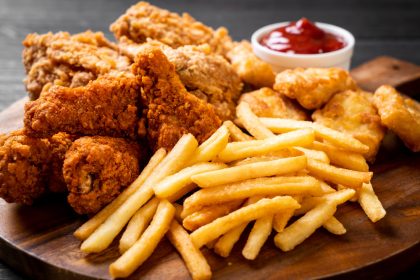Lucy Wambui died last October while undergoing liposuction surgery-which involves removal of fat from the stomach, hips, thighs, buttocks, arms, neck
There was near collective shock in October last year when news broke out that Lucy Wambui, the wife of renowned Kenyan businessman Francis Ng’ang’a, had lost her life while undergoing liposuction surgery at a popular cosmetic spa in Nairobi.
Her detailed autopsy report, which was compiled by pathologist Dr Peter Ndegwa, showed her cause of death was ‘cardiorespiratory failure due to septicaemia due to acute peritonitis’. The report further stated that ‘The two operations before HER demise were significant’.

The two operations referred to in the report were abdominal fat liposuction procedures that Wambui had undergone at the clinic. Liposuction involves using vacuum suction to remove fat from specific areas of the body, like the stomach, hips, thighs, buttocks, arms or neck.
Unfortunately for Wambui, during the procedures on her abdomen, a surgical tool punctured her intestines, causing faecal matter to be released into her abdomen. This caused a severe infection (septicaemia due to acute peritonitis) that eventually led to her death.
Weight loss is a struggle for many Kenyans and a significant population worldwide. While liposuction is not considered a weight loss procedure, many people, especially women, use it to get rid of unwanted fat, often after diet and exercise has failed to work.
Medical doctors and nutritionists recommend healthy eating, controlled meal portions, and exercise as the perfect formula for shedding off extra kilos. This requires a lot of intentionality, mental strength, and discipline.
Unfortunately, many give up on their weight loss journeys and fall back into old habits of unhealthy eating and sedentary lifestyles. I have been a victim one too many times as resisting cakes and chocolates is sometimes too much to ask my sweet tooth. It takes a lot from me to resist the magical scent of sweet vanilla and full-bodied cocoa with a hint of cinnamon, perfectly mingling in the vicinity of bakeries.
A survey done by Lancet Kenya in 2022 revealed that 27% of adults are either overweight or obese. This constitutes 38.5% of women and 17.5% of men in Kenya. Amos Mulu and Subas Neupane’s 2023 study on The Association of Maternal BMI with Overweight among Children Aged 0–59 Months in Kenya also revealed that five per cent of Kenyan children under five were overweight.
Their research findings suggested an association between maternal BMI (body mass index) and obesity in children. Overweight and obese mothers were found to be at high risk of bearing overweight babies.
There’s immense peer pressure on social media to achieve ‘socially acceptable’ body weight
The World Health Organization (WHO) defines obesity as an excessive body weight that increases the risk of health problems including non-communicable diseases such as hypertension, heart disease, and type 2 diabetes mellitus. Obesity is also a risk factor for certain cancers, such as those of the breast, uterus, pancreas, and kidneys. The WHO considers a person overweight if his/her BMI is over 25 and obese if it is greater than 30.
BMI is a medical screening tool that estimates the amount of body fat one has by measuring your height-to-weight ratio. A normal BMI for adults ranges between 18.9 and 24.9.
There’s immense peer pressure on social media for people to achieve an aesthetically pleasing and ‘socially acceptable’ body weight. Consequently, many Kenyans have turned to questionable and extreme methods of losing weight. While still new in the market and quite costly, liposuction is just one of these methods.
The sight of traditional vendors in ethnic clothing hawking brown-coloured concoctions in distinct, white jerry cans in our towns and residential areas is common. Many Kenyans are going back to traditional and herbal remedies, which they believe work for weight loss.
For instance, among the Maasai community, Orkonyil and Olkokola are examples of traditional medicines that are said to promote weight loss. Orkonyil shrub is scientifically called Rhamnus prinoides. The drug is obtained from its bark or roots through extraction with water. A 2024 study published in The Journal of Phytopharmacology showed that Orkonyil extracts can alter body weight in rats besides lowering blood cholesterol levels.
Popular weight loss methods among Kenyans include semaglutide injections, weight loss supplements, body toning, weight loss surgeries
On the other hand, traditional Maasai infusions (tumuka), tonics (teyara) and the controversial castor seed have purgative, diuretic, and emetic action. After taking them, they trigger bouts of diarrhoea, often lengthy and intense, which people confuse for cleansing and weight loss.
Safety concerns of traditional herbal medicine are still a concern today. The hygiene status during preparation, source of ingredients, standardization, and official registration are often overlooked by many Kenyans who focus on perceived effectiveness. Moreover, some of these traditional vendors may prioritize profits over safety.
Popular weight loss methods among the Kenyan elite and upper middle class include semaglutide injections, weight loss supplements, body toning, and weight loss surgeries.
Semaglutide, brand name ozempic, is a diabetes drug that is also used off-label for weight loss management in individuals without diabetes. It works by reducing appetite and promoting stomach fullness. In Kenya, one shot of the injection costs a whopping Ksh50,000.
On June 4, 2021, The United States Food and Drug Administration (FDA) approved semaglutide for weight loss under the brand name Wegovy. However, Kenya’s Pharmacy and Poisons Board (PPB) has not approved semaglutide for weight loss.
Common side effects associated with ozempic use include nausea, vomiting, and diarrhoea. These side effects are generally mild and improve as the body adjusts to the drug. Severe side effects such as worsening diabetic retinopathy, which may result in blindness, have been reported by the European Medicines Agency. Diabetic retinopathy is caused by high blood glucose levels damaging the light-sensitive tissue (retina) at the back of the eye.
On their website, experts at Avané Cosmetic Dermatology Clinic and Plastic Surgery located in Nairobi recommend ozempic injections to overweight and obese individuals who struggle to lose weight through exercise and diet. They also recommend combining the injections with lifestyle changes such as exercise and diet for significant weight loss.
The uptake of medical weight loss surgeries such as gastric bypass is increasing in Kenya. Gastric bypass surgery alters the digestive system by reducing the size of the stomach and the length of the small intestines. This procedure reduces food intake and calorie absorption via the small intestines, with more women open to gastric bypass surgery than men.
Another extreme weight-loss trend as reported on social media is jaw-wiring
Fasting for long – more than 16 hours – has also been touted as effective for weight loss. However, it is not sustainable as regular, prolonged fasting increases the risks of health complications.
“Limiting mealtimes to a period of just eight hours a day was linked to a 91% increase in the risk of death from heart disease in the study,” Professor Victor Wenze Zhong presented this study’s findings at the American Heart Association at the Epidemiology and Prevention, Lifestyle and Cardiometabolic Scientific Sessions 2024.
Another extreme trend as reported on social media is jaw wiring, a medical procedure whereby the upper and lower jaws are wired together. It is often performed by dentists to treat fractured jaws. However, influencers are now taking it up for weight loss purposes as it limits one to a strict liquid diet.
This extreme weight loss procedure poses unnecessary risks, including damage to teeth, choking hazards, infections following surgery, and malnutrition secondary to extended fasting.
The dilemma of influencer marketing and social media cannot be ignored. What, then, is the way forward for Kenyans struggling with obesity and want to shed off extra kilos?
For one, diet is key. Just tart by reducing their sugar and processed food intake. Having sugarless tea for breakfast but a soda for lunch is futile. Dieticians recommend eating a balanced plate containing 50% vegetables and fruits, 25% proteins, and 25% carbohydrates.
Support groups –which provide mutual support and a sense of community through shared experiences – are important for those not disciplined in their weight-loss journeys.
Exercise is the next best option. While joining a gym program is good, there are other less expensive options. For instance, one loses 300-500 calories by walking 10,000 steps. One-month consistency will guarantee an average loss of 9,000- 15,000 calories.
On the issue of influencer marketing, it is crucial and ethical if they provide accurate, evidence-based information and disclose any sponsorship or conflict of interest to maintain transparency and safeguard public health.
Lastly, Kenyans should exercise caution to prevent further health issues while seeking remedies for weight loss.
Dr Sharon Mumbua, a pharmacist, is an essayist and creative nonfiction writer.






















Such a great read